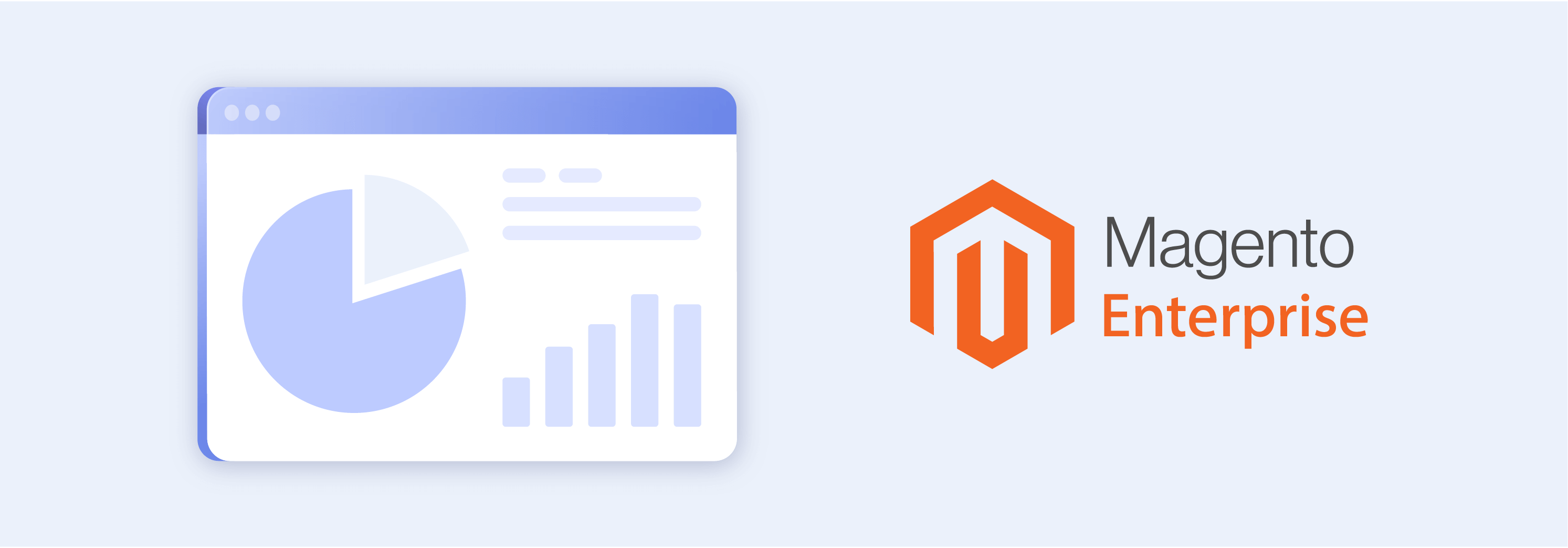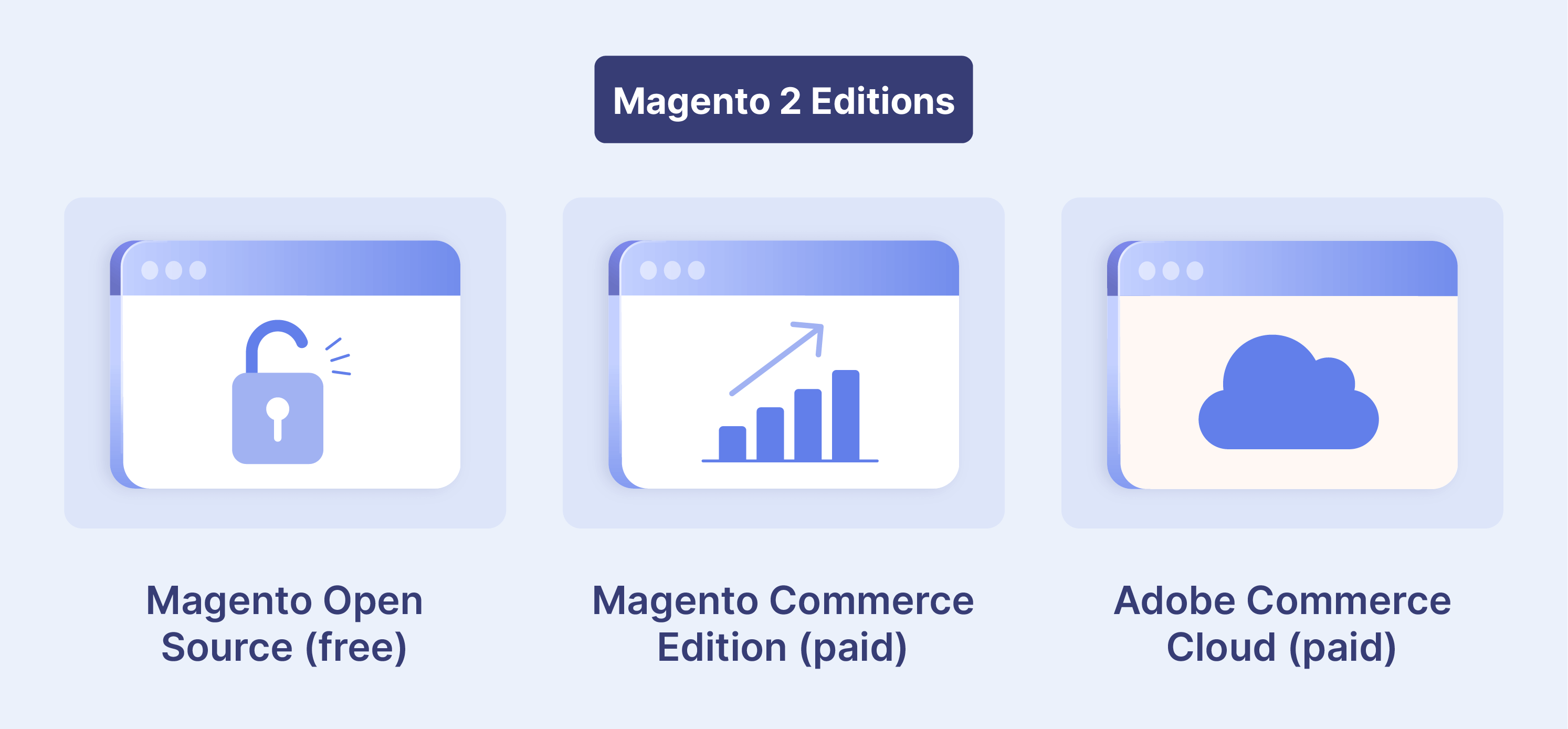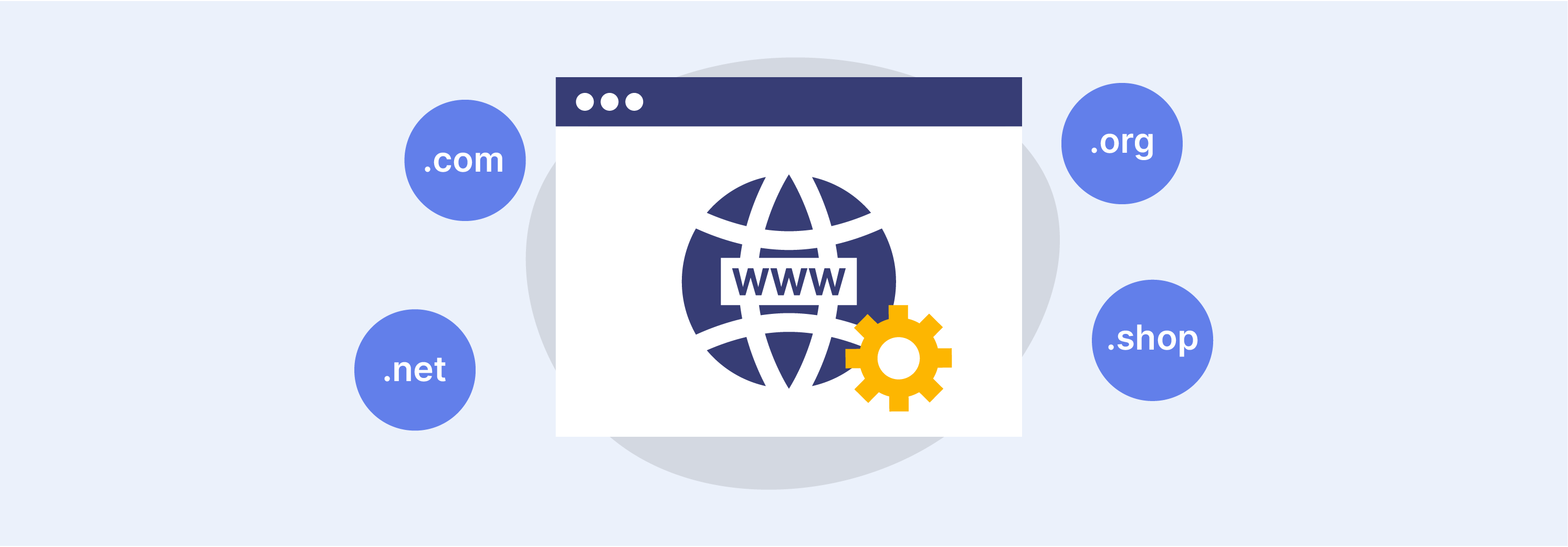
How Much Does Magento Enterprise Cost? Pricing Breakdown
Magento Enterprise cost varies based on factors like company size and customization needs. Additional costs may include licensing fees, hosting fees, and extensions or integrations. This guide clarifies and compares Magento Enterprise pricing to Magento Community and Magento Commerce Cloud. It will also evaluate the key factors that affect the Magento price.
Key takeaways
-
Discover the advanced features of Magento 2 Enterprise Edition for enhanced functionalities and competitive advantages.
-
Explore the three primary editions of Magento – Open Source, Commerce, and Commerce Cloud – each catering to different business needs.
-
Learn how factors like desired functionality, customization, and integrations influence the overall expenses associated with Magento development.
-
Gain insights into the breakdown of Magento development costs, covering licensing, hosting, domain, SSL certificate, and more.
-
Understand the importance of professional support and maintenance services for Magento 2.
-
Learn how hosting providers can optimize your Magento management costs through continuous monitoring and automated updates.
What is Magento 2 Enterprise Version?

Magento 2 Enterprise Version, or Magento Enterprise Edition, represents the top-tier offering in the Magento eCommerce platform lineup. It is a premium, paid version with advanced features and tailored functionalities that empower store owners to excel in a competitive market.
Some notable features of Magento Enterprise Edition include:
-
Business Intelligence Dashboards: These dashboards provide in-depth insights into your eCommerce operations. They help you analyze sales data, track customer behavior, and monitor inventory levels. This data-driven approach assists in making informed decisions, optimizing product offerings, and identifying growth opportunities.
-
B2B Functionality: For businesses involved in B2B transactions, Magento Enterprise Edition offers advanced tools. It helps manage complex pricing structures, streamlines ordering processes and customer-specific catalogs. This functionality simplifies managing bulk orders and strengthens relationships with business customers.
-
Advanced Marketing Tools: With sophisticated marketing tools, you can create personalized campaigns, target specific customer segments, and automate marketing tasks. It leads to improved customer engagement, increased conversions, and a higher return on investment (ROI).
-
Content Staging and Preview: Content staging lets you plan and schedule content updates on your ecommerce website. This feature is invaluable for coordinating product launches, promotions, and seasonal updates, ensuring a seamless user experience.
-
Customer Loyalty Tools: Loyalty programs and reward systems foster customer loyalty, encouraging repeat purchases and increasing customer lifetime value. These tools help build strong, long-term relationships with your customer base.
-
WYSIWYG Page Builder: The What You See Is What You Get (WYSIWYG) page builder simplifies website content creation. It empowers non-technical users to design and update web pages effortlessly, reducing reliance on developers and speeding up content delivery.
-
Visual Merchandising: Visual merchandising allows you to arrange products intuitively on your website. Presenting appealing and organized products enhances the user experience, increases sales, and promotes upselling and cross-selling opportunities.
-
Dedicated Support: Access to dedicated support means that any technical issues or questions you encounter are promptly addressed. It minimizes Magento downtime, ensures platform reliability, and provides peace of mind for your ecommerce operations.
What are the different editions of Magento?

Magento has three primary editions: Open Source, Commerce, and Commerce Cloud.
-
Magento Open Source (Formerly Magento Community Edition): Magento's free, open-source version. It's a great choice for small to medium-sized businesses looking for a robust ecommerce platform without licensing fees.
-
Magento Commerce (Formerly Magento Enterprise Edition): It is Magento's premium, paid version. It's tailored for larger businesses and has advanced features, technical support, and regular updates to help you run a high-performance online store.
-
Magento Commerce Cloud: This is a cloud-hosted version of Magento Commerce. It offers the same advanced features as Magento Commerce but adds the benefits of cloud hosting, scalability, and easy management. It's an excellent choice for businesses leveraging the cloud for their ecommerce operations.
Factors Affecting Magento Development Costs
Several factors influence the overall expenses associated with Magento development, including:
-
Desired Functionality and Customization: The level of customization and additional functionality you require beyond Magento core features and store design.
-
Integrations: The number and types of integrations, such as shipping providers, payment gateways, and third-party solutions. It includes Product Information Management (PIM) and Customer Relationship Management (CRM).
Magento Development Costs Breakdown
1. Magento License Costs

Magento offers different editions, each with its pricing structure:
- Magento Open Source: This edition is free.
- Magento Enterprise (Adobe Commerce): The pricing for Magento Commerce is based on your annual gross revenue, with costs ranging from $22,000 to $125,000 per year. This structure ensures scalability and aligns costs with business **growth.
- Magento Commerce Cloud (Adobe Commerce Cloud): Similar to Magento Commerce, your annual gross revenue determines the pricing for Magento Commerce Cloud, with fees ranging from $40,000 to $190,000 per year.
| Annual gross revenue | Annual Magento Enterprise Pricing | Annual Magento Commerce Cloud Pricing |
|---|---|---|
| Less than $1,000,000 | $22,000 | $40,000 |
| $1,000,000–$5,000,000 | $32,000 | $55,000 |
| $5,000,000–$10,000,000 | $49,000 | $80,000 |
| $10,000,000–$25,000,000 | $75,000 | $120,000 |
| More than $25,000,000 | $125,000 | $190,000 |
2. Magento Hosting Expenses ($10–$50/month)

-
Magento Commerce Cloud: Users of this version need not be concerned with hosting costs as it includes automated and managed hosting within the license.
-
Magento Open Source and Magento Enterprise: These versions require specialized hosting to function optimally. Depending on your website's performance and functionality needs, hosting expenses typically range between $10 and $50 per month.
3. Domain Name Costs ($10–$400/year)

The annual prices for domain names can vary based on the type you choose:
- Brand New Domain: Registering a new domain typically costs between $10 and $20 per year. It is a common choice for businesses starting fresh or rebranding.
- Expired Domains: If you opt for an expired domain, the annual prices can range from $20 to $400 annually. These domains may carry some history, which could benefit certain business strategies.
4. SSL Certificate Costs ($50–$300/year)

An SSL certificate encrypts data exchanged between your website and visitors, safeguarding sensitive information such as payment details and personal data.
The annual expenditure for an SSL certificate typically falls within the range of $50 to $300. This investment ensures secure data transmission for eCommerce websites handling sensitive customer information.
5. Magento Web Design Costs ($0–$5,000+)

When designing your Magento website, you have two primary options:
Ready-Made Magento Theme: You can opt for a pre-designed Magento theme. The cost for such themes typically ranges from $0 to $180. These themes offer a cost-effective solution for a visually appealing online store.
Custom-Made Theme: If you desire a unique and tailored design, you must engage a website designer to create a custom theme. Here's what you should know:
- Development Time: Developing a custom theme typically requires between 40 to 160 hours of work by Magento developers.
- Hourly Rate: The hourly rate for developers varies, but a minimum rate is around $40 per hour.
- Mobile Responsiveness: Given customers' increasing use of mobile devices, ensuring your website design is responsive is beneficial. It offers a user-friendly experience on tablets and smartphones.
- Total Cost: Considering these factors, the total cost for a custom design can exceed $5,000.
6. Magento 2 Development Costs ($1,800–$10,000+)

When it comes to developing a Magento 2 website, five key pages significantly impact customer engagement and Magento conversion rates:
- Homepage
- Category Page
- Product Page
- Shopping Cart Page
- Checkout Page
Even when using a free pre-made Magento theme, Magento developers typically need to invest at least 40 hours to customize these essential pages to align with your brand's design. Here's what's involved:
- Creating Banners: Designing and integrating banners for promotional purposes.
- Adjusting Colors: Tweak text, icons, and button colors to match your brand's identity.
- Rearranging Blocks: Moving and arranging content blocks for optimal layout and user experience.
Considering the average hourly rate for a Magento developer is around $50, the minimum cost for developing a Magento website starts at $1,800. The final cost can vary depending on the complexity of your design and additional functionalities. In order to optimize expenses, some businesses may consider IT outsourcing or nearshoring, setting up a global in-house center, etc.
7. Extensions Costs ($60–$600/extension)

Varied Pricing: These add-ons can vary significantly, ranging from $60 to $600 per extension. For premium Magento extensions with advanced features, anticipate costs between $50 and $500.
Custom Extensions: If you require specific functionalities tailored to your online store's unique needs, you can opt to create a custom Magento extension. However, this option typically involves higher expenses. Building an average Magento module can cost approximately $2,500 to $5,000.
Note: It's important to note that these prices mentioned for extensions do not include design expenses, which can be additional.
Many Magento stores utilize additional extensions for various reasons, including:
- Customer Support Features: Enhancing customer support and communication.
- Improved Layered Navigation: Providing smoother and more efficient product browsing for customers.
- Advanced Search: Enhancing the search functionality to help customers find products quickly and easily.
These extensions are readily available on the Magento marketplace, allowing you to integrate them into your online store seamlessly.
8. Payment Provider Fees (2.9% + $0.30/transaction)

Here's what you need to know about payment provider fees:
-
Popular Options: Widely used payment solutions such as Stripe,
Authorize.net, and PayPal collectively handle approximately 75.6% of global payment transactions. -
Setup Costs: These reputable payment service providers typically do not require any setup fees, making them accessible to businesses of various sizes.
-
Transaction Fees: The transaction fee is the primary cost associated with payment providers. It's important to note that this fee varies based on the provider and the type of transaction. Generally, you can expect to pay a fee starting from 2.9% of the transaction amount and an additional fixed fee of $0.30 per transaction.
-
Research and Selection: Conduct thorough research to determine your business's most cost-effective and suitable payment service provider. Compare the features, transaction fees, and service quality offered by different providers before deciding.
9. SEO & Digital Promotion Costs ($10,000–$40,000/year)

- Competitive Environment: Online markets are fiercely competitive, making it important for businesses to effectively allocate resources to promote their websites.
- Niche Products: The need for extensive SEO and promotion may be reduced if your business deals in niche products or services. However, for most ecommerce ventures, these efforts are necessary.
- Cost Range: On average, businesses can expect to invest between $10,000 and $40,000 annually in SEO and promotion services. These costs are driven by factors such as the competitiveness of your industry, target audience, and marketing strategies.
Comparison of Total Magento Development Costs Across Magento Editions
| Magento Enterprise | Magento Open Source | Magento Commerce Cloud | |
|---|---|---|---|
| Magento license cost | $22,000–125,000/year | 0 | $40,000–190,000/year |
| Hosting | $500–6,500/year | $100–500/year | 0 |
| Domain name | $10–400/year | $10–400/year | $10–400/year |
| SSL certificate | $5–300/year | $50–300/year | $50–300/year |
| Design | $0–5,000+ | $0–5,000+ | $0–5,000+ |
| Development | $10,000+ | $1,800–10,000+ | $10,000+ |
| Extensions | $60–600/extension | $60–600/extension | $60–600/extension |
| Payment providers fees | 2.9% + $0.30 per transaction | 2.9% + $0.30 per transaction | 2.9% + $0.30 per transaction |
| SEO & digital promotion | $10,000–40,000/year | $10,000–40,000/year | $10,000–40,000/year |
| Total Magento development fees | $43,000–189,000+ | $12,000–57,000+ | $60,000–247,000+ |
Importance of Support and maintenance for Magento 2
-
Website Reliability: Downtime, unexpected errors, and security breaches can disrupt your business at any time. Regular updates and maintenance are essential to keep your eCommerce site running smoothly.
-
Ongoing Requirements: Many software and extensions necessitate periodic updates to ensure they function optimally. Some may even have expiration dates, emphasizing the need for ongoing attention.
-
Freshness and Relevance: Regular adjustments and updates are required to keep your eCommerce website modern and relevant. Customer needs and eCommerce trends evolve, making it essential to adapt and stay competitive.
-
Professional Support Services: To safeguard your website and streamline maintenance, consider enlisting professional Magento experts to provide:
-
Renewal Services: These experts can manage domain name, certificate, and license renewals, ensuring your site's continued functionality.
-
Security Measures: Professional teams can implement security measures to safeguard your online store.
-
Regular Backups: Routine backups are implemented for data security. Professional services can ensure daily and routine backups, preventing data loss.
-
Technology Updates: Professionals can help you stay updated and implement the latest technology changes on your website.
-
Flexibility and Adaptability: An ecommerce website should remain flexible to adapt to changing trends and customer needs. Professionals can ensure your site remains adaptable in the face of transformations.
Optimizing Your Magento Management Costs with Hosting Providers
-
Website Monitoring and Audit: Magento hosting providers offer continuous website monitoring and audit services, ensuring the health and security of your eCommerce platform. These services are typically included in hosting packages, ranging from $20 to $200 per month.
-
Magento Update and Security Patch Installation: Ensure your Magento store stays updated and secure. Hosting providers often provide automated updates and security patch installations as part of their services, typically included in hosting fees.
-
Extensions Update: Regular extension updates are important for functionality and security. Hosting providers offer seamless extension updates, reducing the need for additional expenses.
-
Migration and Replatforming: Hosting providers can assist with these complex tasks if migration or re-platforming becomes necessary. It costs less than hiring external specialists. Prices vary based on the scope and complexity of the project.
-
Magento Performance Optimization: Hosting providers offer optimization services, often included in hosting plans, with additional optimization packages available at varying costs.
-
New Features Development: Hosting providers also extend support for new feature development, offering competitive rates for customizations and enhancements.
-
Urgent Support for Magento: Hosting providers prioritize urgent support, ensuring quick resolutions to critical issues. Costs for urgent support services can range from $50 to $200 per incident.
-
Bug Fixing: Effective bug fixing is integral to website maintenance. Hosting providers include bug-fixing services as part of their support packages.
FAQs
1. How much does Magento 2 Enterprise Edition cost?
Magento 2 Enterprise Edition pricing varies based on company size and customization needs. The cost ranges from $22,000 to $125,000 per year, ensuring scalability in alignment with business growth.
2. Are there additional expenses beyond the Magento license fee?
Yes, additional costs may include licensing fees, hosting fees, and expenses for modules or extensions. These factors and your company's requirements contribute to the overall investment in implementing Magento 2 Enterprise.
3. Can I integrate third-party modules with Magento Enterprise Edition?
Certainly, Magento Enterprise Edition supports integration with third-party modules. It allows you to enhance functionality and customize your online store based on your business needs. Ensure compatibility and follow best practices during the integration process.
4. Is there a subscription model for Magento Enterprise Edition?
Magento Enterprise Edition operates on an annual subscription model. The Magento pricing is determined by your company's annual gross revenue, offering flexibility and scalability to accommodate different business sizes.
5. How does Magento Commerce Cloud differ from Magento Enterprise?
Magento Commerce Cloud is a cloud-hosted version of Magento Commerce, offering the same advanced features. The key difference lies in the hosting, providing cloud benefits such as scalability and easy management. It is ideal for businesses leveraging cloud infrastructure for their e-commerce operations.
6. Can I upgrade from Magento Open Source to Magento Enterprise?
It is possible to upgrade from Magento Open Source to Magento Enterprise. The upgrade process involves assessing your business needs, ensuring compatibility, and following a structured implementation plan. Professional support can be valuable during this transition to optimize the upgrade process.
Summary
Magento Enterprise costs range from $22,000 to $125,000 per year, depending on company size and customization needs. This guide covered the features of Magento 2 Enterprise Edition, its pricing structure, and the factors influencing development costs. It also discussed the breakdown of Magento development costs. Explore Magento server hosting solutions to align with the scalability and security requirements of your e-commerce operations.



